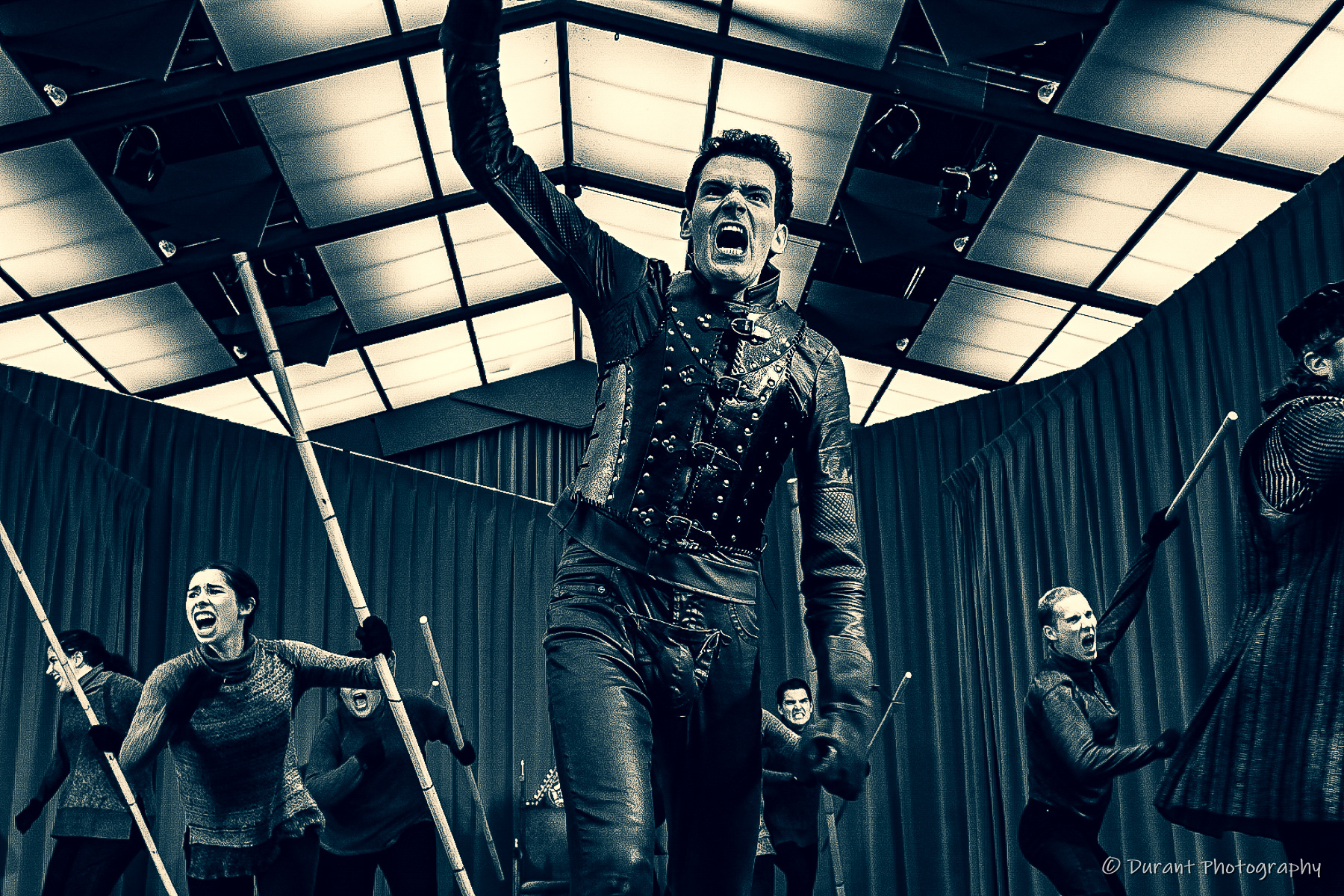For the new impactmania and UCSB program: Human Mind and Migration (HMM), we are featuring migrants who have been contributing cultural, social, and economic wealth and health to their adopted countries. The series Modern-Day Migrants in the Performing Arts explores how opportunities in art and performance can be a catalyst for migration, and how this migratory background has influenced artists’ creative output.
Add your migration story to the HMM program: www.hmm.ucsb.edu.
Irwin Appel is the current Chair of the Department of Theater and Dance at the University of California, Santa Barbara (UCSB), a professor of theater within the department, and the founding artistic director of Naked Shakes. From 2005-2018 until becoming department chair, he was the director of the Bachelor of Fine Arts (BFA) Actor Training Program — the only BFA Acting Program in the UC System. He has also worked as a professional actor, director, and composer across the United States as well as internationally since 1982. He received his education and training at Princeton University and The Juilliard School, where he was awarded an MFA equivalent.
impactmania speaks with Irwin Appel to gain academic insight on the life of a traveling actor, how one designs curriculum in the performing arts for a global pool of students, and what seems to make plays universal even when they are consumed by different cultures. Throughout, he excitedly advocates for using theater as an avenue for inspiring humanity and empathy within local communities and world-wide.
BY NATALIE GOMEZ
As someone who has been involved in all avenues of theatrical performance, including acting, directing, composing, and teaching around the world, in what ways have you noticed theater driving cultural and societal impact?
I’ve noticed that theater is very much local in ways that I didn’t think about when I was first starting my career. Oftentimes, professional theaters hire professional artists from New York or Los Angeles to go to a different city to create a production. Then that artistic team leaves and doesn’t really stay in that community.
I recently directed a production of Macbeth down in Orlando, Florida and I was actually a bit unsettled because after opening night I [had to] go back to Santa Barbara. I wanted to stay and meet the audience more and feel how this community was responding to the work in a particular way. I was envious of the people who got to stay and really get to know the members of that community.
I also think that even in Santa Barbara or at theaters around the country, more theaters are looking for programming that really relates to what’s going on in that community. A theater in Texas might plan a different program about immigration than might a theater in Minnesota.
Now around the world I’ve done theater in the Czech Republic. I’ve taught workshops on Naked Shakes in China and Greece. I’ve done conferences on theater in Poland, I’ve been to a conference in Zurich, Switzerland, and I’ve watched the way different theater is approached. I’m really interested in Europe because I love the different cultures that are within very short distances of each other.
I’ve seen a lot of theater in different languages. I love going to theaters in different places and just seeing the different approaches. One of my biggest interests is Shakespeare — it’s really interesting to watch the way Shakespeare’s treated all over the world.
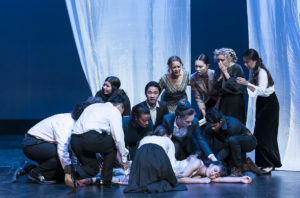
UCSB Department of Theater and Dance students in Irwin Appel’s Naked Shakes production of Shakespeare’s “The Winter’s Tale” at the Hatlen Theater in Fall 2019.
Do you consider the cultural context of your audience when staging and performing Shakespeare such as your performance in Prague?
Yes, but I would almost answer that question, considering the cultural context, more when I’m doing shows at UCSB. For example, when we did The Winter’s Tale I was really excited that my main audience was going to be college students who maybe had never seen a Shakespeare play before.
I wanted the play to really speak to that — not just to feel like it was taking your medicine or something you are required to do so. For example, you, yourself were in that class. Maybe you never would have gone to that Shakespeare play on your own. You thought okay, I have to go and then hopefully when you were sitting in that audience you had an experience that was really transformative. Hopefully you said to yourself, I want to do more, I want to learn more about the play.
So in a way, I feel there’s a definite cultural moment. One of the things about Naked Shakes, my company, is that for many years in a row now, we have been able to require the entire Freshman Summer Start Program to attend these shows. That means that for all of these people who haven’t even officially begun college yet, this is their first cultural experience in college, and it’s the way we do Shakespeare.
I find that really exciting. We’re basically saying immediately, everything you expect from high school, from middle school, all the ways that you got into Shakespeare — we’re flipping that on its head.
And that excites me in terms of Prague. Prague is an interesting example, because Prague is full of 30,000 [American] expatriates. The Prague Shakespeare Company was started as an English speaking Shakespeare company by one of these expats out of feeling there was an audience there who would want to go see Shakespeare in English.
Now interesting here [at UCSB], we also have dance in our department. If you’re in dance, language is not a barrier in the same way, same thing with music, you can perform all over the world and in a way the language is more universal. But theater — being about language in many cases — makes it a little bit more difficult when you’re going into these different cultures and dealing with plays like Shakespeare.
If you’re gonna do Shakespeare, let’s say, in Czech, or in German, or in Polish, you’re doing it, by definition, in translation. And when you’re doing something in translation, you’re really looking at another writer’s [work], you’re looking at the original play through the lens of another writer. I feel fortunate that we speak the same language Shakespeare did so that we can at least see his intent through the language.
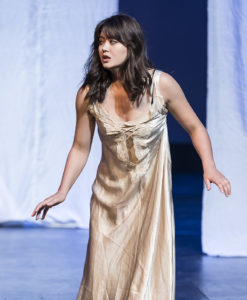
Director Irwin Appel encourages his students to curate their own costumes in Naked Shakes productions. Kat Cleave chose a haunting dress to get into the role of Hermione in Shakespeare’s “The Winter’s Tale.”
Has teaching students, both at UCSB and internationally, changed the way you view theater?
Absolutely. First of all, what I was saying before about the cultural goal with students here [at UCSB] is there’s nothing more thrilling to me than turning somebody on to theater or to Shakespeare, who didn’t know it was something that was going to affect them so much. Especially when that someone is young, because we need people to continue to go to the theater when they get older.
I’m hoping that you and your friends are going to become the next subscribers. You’re going to buy tickets to your local theater and that you’re gonna keep theater alive. I think right now theater is kept alive by the people who want to do theater and the people who want to see theater. Sometimes the people who want to do theater have trouble finding an audience of people who want to see it and so we need to cultivate new, young audiences.
I had a really exciting experience last year where I taught Shakespeare in China. What was thrilling for me was because it was actually very similar to the way I would teach it at UCSB. I got the same reactions — even though [China is] thousands of miles across the globe, [with a] different culture and different language. The fact that the essence of it was coming through in the same way at both places really brought home to me the universality of human beings.
I believe that if people would travel more there would be more peace on Earth. Because when you travel, when you meet people who are different than you, you don’t hate them. You don’t think of them as “the other” nearly as much. You, instead, are more respectful of their culture and feel a kinship with them as human beings that is very different than if you live a very cloistered, sequestered life.
That’s really been something I’ve learned so much. It is something I want to continue to do for the rest of my life. I would love to do Shakespeare and work with students in every country in the world.
When you initially pursued acting and theatrical performance, did you ever consider how travel would become a significant part of your career?
My first job was [with] a company called The Acting Company, [protected by] the [labor] union Actors’ Equity. We traveled the country in a bus, and performed in probably over thirty states. That was a job that changed my life.
Because since that time, it’s almost like a country song or something, I have loved life on the road. I would always look for any excuse [to travel]. If you told me, I need somebody to drive my car across the country, I’d probably volunteer to drive your car for you.
I love going to all of these different places. Sometimes we would go to big cities, sometimes we would go to small towns that had never had a Shakespeare play. And the whole town would throw a party for us after the show. It was so moving. I didn’t know that travel was going to become such an important part of my life and career.
But I got a taste of it, the actor’s life. I tell students here [at UCSB] who want to be actors, the moment you make a plan of where you want to live, that will probably be the day you get a job somewhere else. The truth is actors are nomads, wanderers. There are actors I know who don’t have a permanent home — they go where the job is.
In a way, there’s a real romance to living like that. You’re always living in temporary housing and in new cities. Some people really love that kind of thing — I actually love it.
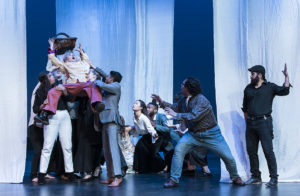
For Naked Shakes productions, such as “The Winter’s Tale,” Irwin Appel combines the efforts of BFA acting students from the Theater and Dance Department and UCSB students who stand out in open auditions. The stage and props remain minimal to let the power of Shakespeare’s words and the actors’ performances shine.
Do you feel like the theater can become a home?
The theater itself you mean?
Yes.
Yeah, I think you just nailed it Natalie. The theater is the home for people like me. That’s why people like me can meet people in other countries who do theater, and we understand each other instantly. We all know what it means that the show must go on.
We all know what it means to go through tough rehearsals, to try to get audiences. We all know the fulfillment you feel when you’re working on a great play or a great role. And we also know what it means to love the life.
Do you feel that there’s something about theater that brings people together?
I do, because it’s about empathy. Somebody thousands of years ago — maybe even back in the caveman days — [decided] there is something about pretending to be somebody else in front of a group of people. That we have in us, mysteriously, who knows how, an ability to play roles of other people, to step into the shoes of other people. It is as human as anything.
I think that people crave [and] need the communal experience — whether it’s a movie, whether it’s a play, whether it’s a television show. They need the human experience of watching this depiction, in a way, of themselves through the art form.
When a play is done well, for example, Arthur Miller‘s famous play Death of a Salesman. I remember seeing a documentary about [a production of] the Death of a Salesman that was done in China with all Chinese actors. People in the audience would talk about [how] “that reminds me of my dad, that was my family,” even though [they have] completely different cultures.
That’s what theater can do. Theater can bring us together and bring empathy in a way that nothing else can.
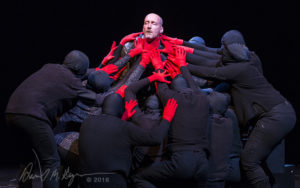
In 2016, Irwin Appel adapted and condensed Shakespeare’s eight history plays into an epic two-play saga called “The Death of Kings.” Each of the plays, “I Come But For Mine Own” and “The White Rose and the Red,” are self-contained and can be preformed individually or in repertory.
How have you seen theater change over the years with the rise of a digital age?
Theater has always had competition from technology, but more so now than ever.
Even though sometimes I go to see a play that is using projections and screens and it can be really exciting and cool looking, — I tend to go away from that when creating theater. Because I feel I am not doing theater to compete with technology [but] more to remind us that the more the technology grows, the more we need the simplicity of the live event and direct human interaction.
Ten thousand years from now, who knows what our phones will be able to do if we’re still around [and] climate change hasn’t destroyed the world by that point, which is a very real prospect. But ten thousand years from now, we’re going to be capable of unfathomable technology. I believe we will still need the live event where a performer walks into a live space with an audience and is just open and vulnerable before that audience.
My company Naked Shakes tends to focus on that — the actor and the word. So again, when this technology grows and grows, I believe we’re always going to need that. So maybe it’s better to not even try [to compete].
I also think there are things that film and television do that theater shouldn’t try to compete with. Film especially is a wonderful way of evoking location by being able to edit from location to location. Film can beautifully realize realistic settings, one after another through editing without having to take the time changing the scenery or anything that theater has to do.
Theater wants to be more abstract in that sense. It wants to not try to recreate what film does well, but instead go [in] an opposite way, and that’s what I strive to do.
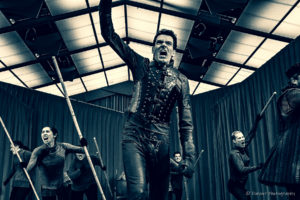
Irwin Appel has created a 90-minute version of the “The Death of Kings” double feature, called “Seize the Crown.” The play received its European premiere at the Prague Shakespeare Company’s Summer Shakespeare Intensive in 2017.
Do you feel that technology opens up more avenues for a global dialogue?
Completely. I think technology is wonderful, I’m not anti-technology. I love some of these YouTube videos I’ve seen where — and I’m a guitar player and musician myself — a song will start in Los Angeles but then you’ll see people playing along with it in Africa and Singapore.
You can see it’s a global look, the way that recording technology has allowed me to play guitar in Santa Barbara, along with somebody playing drums in Ethiopia. That’s unbelievable. It would be interesting to try to create theater in that regard.
One of the magical things about theater is you have to be there. It’s an ephemeral art form. When a show closes, it’s gone. It’s not preserved the way that video is or the way that a music CD or a music file is.
Technology is amazing. This abstract approach that I’m talking about — technology helps to make that possible.
Is theater an important way of spreading cultural change and propelling political change?
Absolutely. I think sometimes it’s much more effective than political change. Because again, [while] political change seems to promote, especially in this day and age, division, theater promotes empathy and inclusion. And I’m addicted to politics. But right now in the United States, politics is dividing us in a very dangerous way.
Whereas, theater has the power to allow people to see it from somebody else’s point of view. That’s really, really important. Sometimes I think that’s the best service we can provide, — just allowing audiences to see a character. To see a different point of view through a character’s behavior.
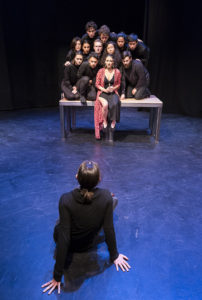
UCSB Department of Theater and Dance students in Irwin Appel’s Naked Shakes production of Shakespeare’s “Hamlet” in Fall 2018 at the Studio Theater.
Do you think there’s something different about watching a character, and seeing their experience in the moment rather than reading it or watching it on a film?
Completely. I would say to you, is there a difference between listening to your favorite musical performer on headphones, and being live in the room with them, playing that song that you love? I mean when you’re in that room with the actor, there’s an electricity that can’t be created any other way.
Now, don’t get me wrong, I love movies, I love TV. Those things have given me great joy and pleasure in my life. But I seek out theater now in a new way, because there’s something special about that event in that moment. It’s very human.
And once it’s over, it’s over.
Do you feel the audience also feels connected to one another?
Absolutely, I just read an article that said that at the theater, there was a study done that people’s heartbeats synchronize. I believe that. When an entire collective audience holds their breath at the same moment. You feel connected to your fellow audience member when something really beautiful is happening on stage.
If I were to ask you’d probably say “it’s not just me experiencing it, the whole room [is] feeling it.” I think that’s the incredible thing about theater, everybody in the audience breathing together. Experiencing it together even though we’re all in our own shells.
It creates a kind of a collective consciousness, it’s very spiritual.
Despite any cultural backgrounds or experiences that they had, they can all feel together in that moment.
I hope so. I believe obviously people are going to have different points of view on things because of their cultural backgrounds. I’m [more] interested in what unites us. I believe we’re all human culture. I’m interested in, as I say, going to these places.
Maybe it comes from traveling around to so many different places and doing a show. And hoping to hook the audience in the same way no matter where we are.
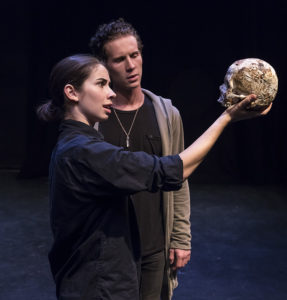
Director Irwin Appel casts roles in Naked Shakes productions based on an actor’s ability to capture the essence of a character, rather than fitting into superficial qualities. This is displayed in his gender-blind casting of BFA acting student Tadja Enos as the male leading character in “Hamlet.”
Do you feel Shakespeare, in particular, does that in a different way?
Absolutely, I think that the reason Shakespeare has lasted so long is because of what Shakespeare says about being human, what it means to be human. Shakespeare has compelled us since he first started writing. It’s made artists want to keep doing these plays over and over again.
And it’s made audiences want to see them. There are other great writers and in fact, [not] all of Shakespeare’s stuff is great. There are plays and scenes that I don’t like as much — even when you take a great play, like Hamlet. But what’s exciting about it is that the collective consciousness of the last four hundred years keeps regenerating every time Hamlet is done.
And that I think is very special and seems to capture people all over the world.
impactmania’s past interviews and programs have been featured in international media, a number of universities, the UN, U.S. Consulates, and have been cited by Harvard Business School, Cambridge Scholars Publishing, and Duke University Press. impactmania’s Women of Impact program was awarded the U.S. Embassy Public Diplomacy grant (2019).
